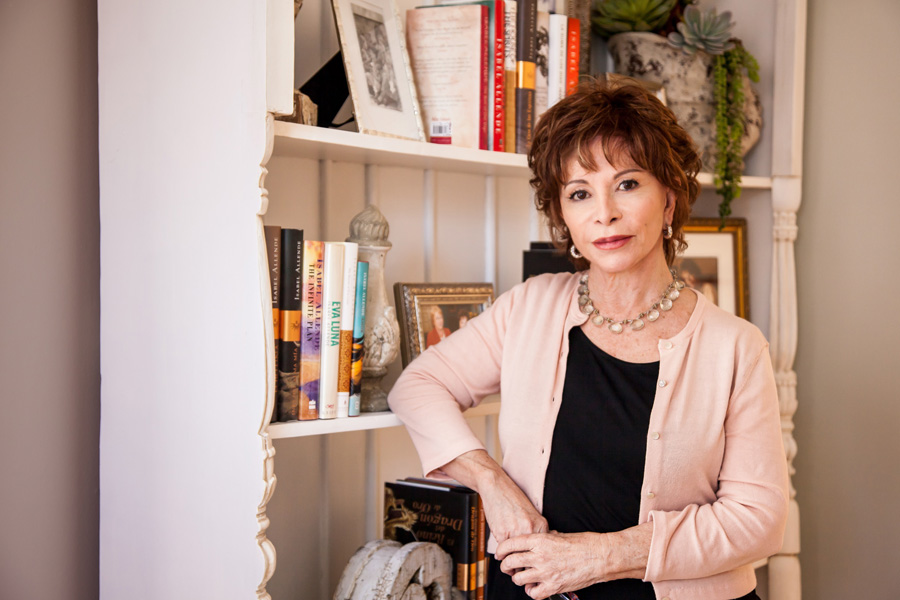Isabel Allende Comes to S.B.
UCSB’s Arts & Lectures Presents an Evening with Acclaimed Writer

“I seek truth and beauty in the transparency of an autumn leaf, in the perfect form of a seashell on the beach, in the curve of a woman’s back, in the texture of an ancient tree trunk, but also in the elusive forms of reality,” writes internationally acclaimed author Isabel Allende in her 2000 novel Portrait in Sepia. Finding beauty and viewing the world with a unique perspective is what Allende does best; as such, her books are used in school curricula worldwide, particularly her critically acclaimed 1982 debut novel, The House of the Spirits. I was bewitched by Allende’s fascinating realm of magical realism in my sophomore year of high school and have yet to find another author who so astutely explores the effect of politics on society under a metaphysical influence.
Allende was born in Peru and raised in Chile. She fled to Venezuela in the 1970s after dictator Augusto Pinochet overthrew her cousin President Salvador Allende in a military coup. Her novels, which explore universal themes of isolation, civil unrest, and humanity’s capacity for love, have been translated into more than 30 languages. Over the phone from her home in Northern California, Allende kindly shared with me her positions on writing and the nation’s current political situation.
You began your writing career at 39. Did you write as a younger person, even if it was purely for yourself? I was very busy supporting a family with three jobs, and I was a journalist. Journalists in Chile don’t make much money. So I had to juggle working at a magazine, on TV, doing lots of things in order to make a living. Then we had the military coup in Chile in September of 1973 and I had to get out of my country. In Venezuela, I could not find a job as a journalist, and I started working in things that had nothing to do with literature. When I started my first book in 1981, I had all these stories inside that I needed to tell, and that was my first experience with fiction, although I’d written theater plays.
Are you a fan of theater? Absolutely. I go even if it’s a bad play. I just sit there and smell the theater.
What inspires you? I don’t know. I feel that things are in the air and I pick them up. I spend so much time alone, in silence, writing, and I pick up things that other people can’t because they’re busy in the world — and in the noise of social media — they’re always in a hurry. What inspires me? What I hear people talking about, traveling, experiences, things I read in other books and watch in movies. But to make the decision to write about a particular novel, that happens in ways that are mysterious to me.
How does it feel to have your work read and instructed in schools around the world? Interesting, because writing is such a private job, and I am alone in silence in a little room typing, and then the book goes out there and touches people who I will never meet, goes into languages I will never be able to read, and has a life of its own. When I get feedback of what’s happening with the book, it’s always such a huge surprise. I still remember very clearly the first book I wrote and the feeling that no one was ever going to read or publish it. Everything that has happened with my books is like a miracle.
You’ve mentioned in the past that you can only write fiction in Spanish. Have you encountered a dissatisfying translation of your work? Are you at all involved with the translation process? My books are translated into 35 languages that I have a contract with, so I have no way of knowing if the translations are good or bad, only in English. And in English, I have had excellent translators. For many years my official translator was Margaret Sayers Peden, one of the greatest translators in this country.
What is your opinion of the current political situation here in the United States? I’m absolutely horrified. I’ve seen before what it is when the deterioration of democracy begins and where it can end. I have lived it. I lived it in Chile, and I lived it in Venezuela. And we think we are immune in the U.S. We think our institutions are so strong that they can withstand any assault, and that’s not true. Look at history. Look what happened in Spain, in Italy, Germany — we had governments that were a disaster for humankind. And so things that can happen in the U.S. now, we can’t even foresee the consequences. So I am terrified.
What do you hope for in terms of the future? I hope for a reaction. I hope for unity and for people who will ask, “What are the values we stand for? Let’s get back to those values and work toward them.” I think it might be good. I have seen in my lifetime how the pendulum of politics goes back and forth from one extreme to the other until eventually it sort of stops in the middle. We can still live many years in a disastrous government until the pendulum goes back to the middle.
4∙1∙1 UCSB’s Arts & Lectures presents An Evening with Isabel Allende on Wednesday, April 19, 7:30 p.m., at the Granada Theatre (1214 State St.). Call (805) 893-3535 or see artsandlectures.sa.ucsb.edu.



